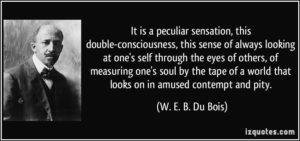The Power of Leaders of Color
Much has been written about the power of a student having one teacher of color. What about the power of leaders of color? How does it affect a school community? People of color have greatly influenced culturally responsive leadership. Even though the cost is high for our leaders of color, the benefits are bountiful!
Recently, I was sitting in a hotel ballroom full of African American school leaders, thinking about our collective power. I was at the California African American Administrators and Superintendents Association (CAAASA) Conference. In the room, I felt a wave of empowerment, community, and purpose wash over me.
Community. Strength.
There, I was reminded of my purpose and felt the strength in the room.
Identity Influences Leadership
As an African American educator, I bring my understanding of race and the social-political context to education. This means that I enter the conversation ready to discuss and address privilege, bias, and racism quickly. Additionally, I don’t require as much background information, data, and testimonies before I can “get to the work.” I am a believer.
After years of surviving and navigating an oppressive system, I am committed to changing it. Because of my personal experience, I feel less attached to the idea of preserving tradition, especially one informed by white supremacy culture.
As a culturally responsive leader, I feel incredibly urgent about pushing and less paralyzed by the fear of making white folks uncomfortable with conversations about race, power, and privilege. (See white fragility) Also, I am less worried about my preserving relationships with adults and more focused on repairing a relationship between students of color and an institution that has kept them out for too long.
Although I have been assimilated into white, middle class, christian, US normative society, I am not all the way in. De Bois would call the awareness of this a “double consciousness“, which means that I speak on the taboo and call out BS.

The Benefits of Leaders of Color
First, I have seen leaders of color “go there.” Specifically, these leaders are unapologetically committed to racial equality and educational equity. Second, as Malcolm X used to say, they “make it plain” or as the youth say, we “keep it 100”. Even when it is not convenient, or in our best interests. The system has a way of letting you know when you are pushing too hard. Personally, even in a district like SFUSD, I have had people tell me to “be appreciative,” “be humble,” and “be patient.”
Still, Leaders of Color use their positional authority to facilitate the conversation, even if facilitating gets spun by traditionalists as ‘force.‘ They are more than the angry black man. Now Leaders of Color are the angry boss, who shrouded under the cloak of equity and university degrees, can ask the hard conversations. And hold folks accountable.
You know the oppressors weren’t expecting this. We’ve come a long way from slave codes and Jim Crow.
Leaders of Color can leverage their power:
-
- establish powerful norms
- create space to discuss and address racial bias and White Supremacy Culture
- question and change the curriculum
- give staff feedback and direction on addressing inequity
- share our experience as a humanizing anchor for the work
However, let’s be honest. Not every person of color has the same social consciousness, studies critical pedagogy, or believes that education should be inextricably linked with social justice. On the other hand, some folks are just approaching their conscientizacao (wokeness) and others have been playing too long for the other team.
Here’s an example, from David Branch, a Principal of Garden City Elementary in Minnesota says. He says, “I took every failure or miss personally; leading to health issues. These were my people I was letting down. But, I realized I was just one part of the solution. The public system was not created to meet the needs of black and brown students. I realized that I needed allies at every level, and that implicit bias was the things holding us back.”
Be Prepared for Resistance, Doubters, and Haters
Anthony Muhammad wrote about how the traditionalists (or white supremacists) will attack you. Traditionalists will use: resistance, slander, defamation, and white fragility. Furthermore, they will focus on technical issues like evaluation timelines, terminology, contracts, and paperwork. This is a distraction from focusing on serving marginalized students.
For example, Ashley Moore, Baltimore, MA Principal says, “For a black woman in leadership, I am often doubted and not taken seriously. My education, credentials, and certifications are often called into question.”
Since white supremacists, can no longer lynch or pistol whip you, the system will “pencil whip you”.
Bust you with the paper game.
That’s why you have to have your Is dotted and Ts crossed. Like a bureaucraticand revolutionary boss.
To be honest, people who know where you stand will love you for your unwavering commitment. For the symbolism you embody and the model you set. I hope you encounter more of the latter than the former.
How School Districts and Supervisors can Support LOCs
We need to know that you have our backs. More times than not, we are going to go out on a limb.
Be there to catch us and pull us up.
We already feel unwelcome in a white supremacist society and folks use micro/macro/actual aggressions all day to re-establish racial hierarchy.
So beat us to the punch.
Don’t wait for us to be the passionate and righteous (angry) POC. Set the conditions and norms as an organization or school district.
You might be using SFUSD’s Braver Norms:
- Keep liberation for the oppressed at the center
- Stay curious in discomfort
- Be a part of the solution towards anti-racism
In SFUSD, it has helped for our previous superintendent to say that we are here to interrupt systemic oppression, and that if you aren’t about that, you should find another job. Our current superintendent, a Black man, put African American students as a focus, and showed our longitudinal data of gaps. He said we can do better. We must. And this year, he is pushing our administrators to deepen our racial equity consciousness by addressing implicit bias, micro aggression, and WSC. BOOM.
Thank you my brother.
If we go to battle, supervisors should send in the reinforcements! Name equity and social justice as a focus. Don’t make us call it out.
You can help us minimize the racial battle fatigue, that makes this work so unsustainable for LOCs. Train your staff, middle managers, and Human Resources on white fragility.
So, What should you do now?
If you are a Leader of Color, remember your power and how to use it. White allies can be in solidarity with LOCs, and take on their struggle too (this helps). And, teachers should be mindful of the effects of White Supremacy Culture on LOCs and combat it! Let’s get to work.





